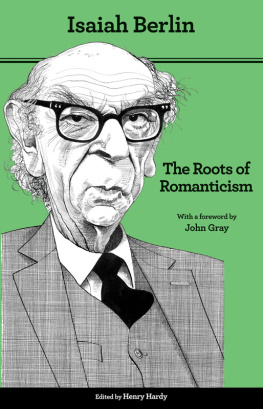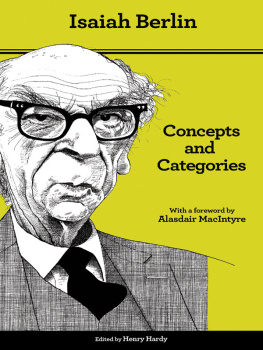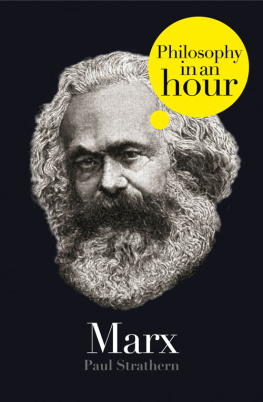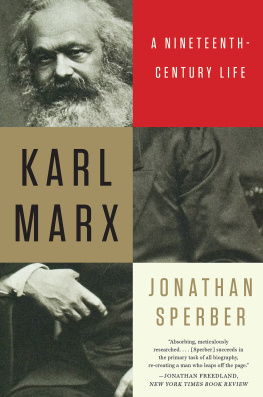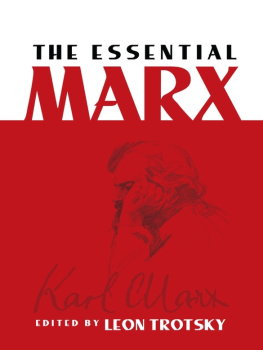
KARL MARX
ISAIAH BERLIN WAS BORN IN RIGA, now capital of Latvia, in 1909. When he was six, his family moved to Russia; there in 1917, in Petrograd, he witnessed both revolutions social democratic and Bolshevik. In 1921 he and his parents came to England, and he was educated at St Pauls School, London, and Corpus Christi College, Oxford.
At Oxford he was a Fellow of All Souls, a Fellow of New College, Professor of Social and Political Theory, and founding President of Wolfson College. He also held the Presidency of the British Academy. In addition to Karl Marx, his main published works are Russian Thinkers, Concepts and Categories, Against the Current, Personal Impressions, The Crooked Timber of Humanity, The Sense of Reality, The Proper Study of Mankind, The Roots of Romanticism, The Power of Ideas, Three Critics of the Enlightenment, Freedom and Its Betrayal, Liberty, The Soviet Mind and Political Ideas in the Romantic Age. As an exponent of the history of ideas he was awarded the Erasmus, Lippincott and Agnelli Prizes; he also received the Jerusalem Prize for his lifelong defence of civil liberties. He died in 1997.
Henry Hardy, a Fellow of Wolfson College, Oxford, is one of Isaiah Berlins Literary Trustees. He has edited (or co-edited) many other books by Berlin, including all those listed above, and is currently working on the fourth and final volume of his selected letters.
Terrell Carver is Professor of Political Theory at the University of Bristol. His extensive publications on Marx and Engels include the Oxford Very Short Introduction to Engels, his own translations of Marxs Later Political Writings, and a thematic reappraisal of Marxs thought in The Postmodern Marx.
For further information about Isaiah Berlin visit
http://berlin.wolf.ox.ac.uk/
ALSO BY ISAIAH BERLIN
*
The Hedgehog and the Fox
The Age of Enlightenment
Russian Thinkers
Concepts and Categories
Against the Current
Personal Impressions
The Crooked Timber of Humanity
The Sense of Reality
The Proper Study of Mankind
The Roots of Romanticism
The Power of Ideas
Three Critics of the Enlightenment
Freedom and Its Betrayal
Liberty
The Soviet Mind
Political Ideas in the Romantic Age
with Beata Polanowska-Sygulska
Unfinished Dialogue
*
Flourishing: Letters 19281946
Enlightening: Letters 19461960
Building: Letters 19601975
KARL MARX

ISAIAH BERLIN
Fifth Edition
Edited by Henry Hardy
Foreword by Alan Ryan
Afterword and Guide to Further Reading by Terrell Carver
PRINCETON UNIVERSITY PRESS
PRINCETON AND OXFORD
Published in the United States of America, its territories, dependencies,
and the Philippine Islands by Princeton University Press, 41 William
Street, Princeton, New Jersey 08540
Requests for permission to reproduce material from this work should be
sent to Permissions, Princeton University Press.
press.princeton.edu
Copyright Isaiah Berlin 1939, 1948
Isaiah Berlin 1960, 1963, 1978
The Isaiah Berlin Literary Trust and Henry Hardy 2013
Foreword Alan Ryan 1995, 2013
Afterword Terrell Carver 2007, 2013
Guide to Further Reading Terrell Carver 2013
Editorial matter Henry Hardy 2013
First edition published in the Home University Library
by Thornton Butterworth 1939
Second Edition published by Oxford University Press 1948
Reprinted with additions 1960
Third edition 1963
Fourth edition 1978
Fifth edition published by Princeton University Press 2013
The moral right of Isaiah Berlin and Henry Hardy to be identified as the author and editor respectively of this work has been asserted.
All Rights Reserved
Library of Congress Cataloging-in-Publication Data
Berlin, Isaiah, 19091997.
Karl Marx / Isaiah Berlin; edited by Henry Hardy; foreword by
Alan Ryan; afterword and Guide to Further Reading by Terrell Carver.
Fifth edition.
pages cm
Includes bibliographical references and index.
ISBN-13: 978-0-691-15650-7 (pbk.: alk. paper)
ISBN-10: 0-691-15650-6 (pbk. : alk. paper)
1. Marx, Karl, 18181883. 2. Communists Biography.
I. Hardy, Henry. II. Title.
HX39.5.B4 2013
335.4092dc23 2012051126
[B]
British Library Cataloging-in-Publication Data is available
This book has been composed in Garamond Premier Pro
Printed on acid-free paper 
Printed in the United States of America
1 3 5 7 9 10 8 6 4 2
To the memory of Marie and Mendel Berlin
EDITORS PREFACE TO THE FIFTH EDITION
The authors admirable ability to translate many abstruse and obscure notions of Marxism into a clear language and his virtuosity in showing connections between personalities, characters, attitudes on the one hand and doctrinal issues on the other are unparalleled in the existing literature.
Leszek Koakowski
I
ISAIAH BERLINS INTELLECTUAL biography of Karl Marx, first published in 1939, has long been recognised as one of the very best concise accounts of the life and thought of a man whose doctrines Berlin described in the closing words of the book as the most powerful among the intellectual forces which are today permanently transforming the ways in which men act and think. With his celebrated genius for empathising with those whose views he does not share, Berlin enters into the mind of his subject and shows us the view from within:without the obscurity of much of Marxs own prose, he presents and explains Marxs ideas, their origins and their power.
Reviewers of the first edition immediately perceived the books virtues. The historian of Russia Richard Charques called it a model of objective clarity.
Forty years on and more the verdict was unchanged, as exemplified by the judgement of Leszek Koakowski one of the foremost twentieth-century authorities on Marx and Marxism quoted above. Moreover, as Alan Ryan and Terrell Carver explain in the essays included in this new edition (the first for thirty-five years), Berlins account has remained fresh and convincing to this day, remarkably unaffected not least because of the detachment praised by the reviewers by the torrent of scholarship about Marx that has appeared since it was first written.
II
The book, then, is still very much alive, and shows no signs of being superseded as one of the most successful introductions to a crucially important but notoriously difficult subject. However, even after the appearance of four successive editions prepared by the author over a period of more than forty years, there remained some not insignificant problems in the text which needed to be resolved. In order to explain what I mean by this I need to be briefly autobiographical.
The previous edition of the book appeared in 1978. I was the editor at Oxford University Press responsible for overseeing the publication of that edition, and I was also then in the midst of editing (not under my OUP hat) the four collections of Berlins essays, originally published under the collective series title Selected Writings, that began my still continuing work on his texts. It was not part of my task at that time to give Karl Marx the attention all his work needed in order to turn in his own characteristically but absurdly self-deprecating phrase what were mere belles-lettres into scholarship. But I knew from my experience with his other writings that this need existed, and it was then that I became aware that one day this text, too, should be attended to in this spirit. The quotations were unreferenced, sometimes misattributed, and often somewhat approximate or worse, starting with the opening epigraph from Joseph Butler, which contained at least three infidelities in twenty-three words. The punctuation was often erratic, and there were numerous other minor blemishes of form and substance that ought to have been spotted by the previous publishers, and were ripe for elimination.
Next page

